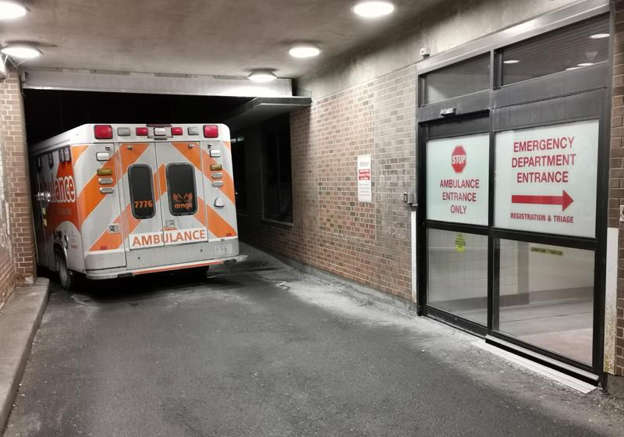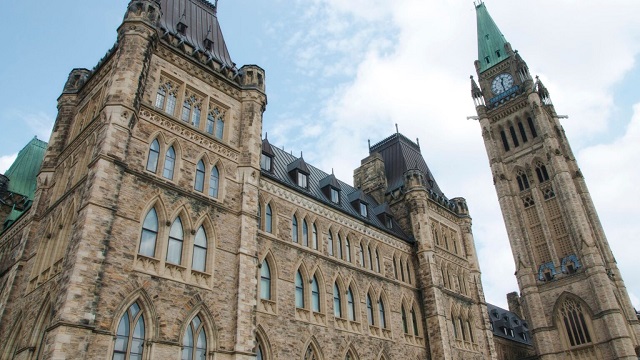Alberta
Province adding 22 ambulance crews including 1 in Red Deer

Adding new EMS supports to improve response times
Record investments will build a stronger, more flexible and innovative system for emergency medical services (EMS) with better access to care and shorter wait times.
Alberta’s government promised that help is on the way for Albertans and the province’s health system. By hiring more staff, putting more ambulances on the road and strengthening mental health supports for front-line workers, Alberta’s government is delivering on that promise.
“We are adding new ambulances and front-line staff and investing in solutions now and into the future to make sure ambulances arrive as fast as possible when Albertans call 911 for a medical emergency.”
The funding boost also supports implementing Health Care Action Plan priorities and recommendations made by the Alberta EMS Provincial Advisory Committee to improve EMS response and the work culture for EMS staff.
Alberta has the best front-line health care workers in the world, and Budget 2023 will put the right supports in place to ensure Albertans get the care they need, when and where they need it.
“Budget 2023 delivers the needed support to the front line and adds more resources to implement the Alberta EMS Provincial Advisory Committee recommendations. The additional funding will help ease worker fatigue and provide more mental health supports to improve the work environment for all EMS staff.”
Adding EMS staff and more ambulances
To improve EMS response time, Budget 2023 invests in adding staff and boosting the number of ambulances on the road. The funding increase will add EMS crews to staff 10 more ambulances in Edmonton, 10 in Calgary, one in Lethbridge and one in Red Deer during peak hours this year.
As part of the ongoing work to improve the central dispatch system and implement the EMS advisory committee’s recommendations, Alberta’s government will provide more than $1.5 million to hire and train additional staff and conduct a review of EMS available resources and how they are used in communities.
Supporting EMS workforce
Front-line staff and community partners asked for more supports to create better work environments, as reflected in the provincial advisory committee’s recommendations. Budget 2023 delivers funding to improve scheduling practices to allow for more breaks, more flexibility in the length of shifts and opportunities to take time off, in addition to providing for more training and development opportunities.
Nearly $1 million will go towards boosting mental health supports for EMS staff across the province. A $3-million investment will address paramedic fatigue in rural communities by adjusting work hours and shift schedules as part of the AHS EMS hours of work initiative.
“This funding increase enables aggressive action on our priority of improving emergency response times. We will hire more staff, increase hours of ambulance capacity, expand partnerships with other community supports and deliver innovative projects. This is about getting Albertans the care they need, where and when they need it.”
EMS-811 shared response, inter-facility transfers and treat and refer
Alberta’s Health Care Action Plan is helping to speed up EMS response times and free up highly trained paramedics from non-emergency calls and transfers. Additional funding will go towards the EMS-811 Shared Response program that transfers calls from Albertans with non-urgent conditions to registered nurses with Health Link.
All these actions will reduce EMS response time by empowering paramedics to focus efforts on urgent calls and diverting them away from situations when their level of care is not medically required.
Medical first response supports in rural communities
Medical first responders provide life-saving care in rural and remote communities until an ambulance arrives. Budget 2023 invests in supporting medical first response and implementing the EMS provincial advisory committee’s recommendations to add capacity and provide additional training and equipment.
Budget 2023 secures Alberta’s future by transforming the health care system to meet people’s needs, supporting Albertans with the high cost of living, keeping our communities safe and driving the economy with more jobs, quality education and continued diversification.
Quick facts
In 2023-24, Alberta’s government is providing $723 million in operating funds for EMS, an increase of $138 million to support EMS priority actions, including:
- $47 million for additional EMS capacity to put more ambulances on the road, hire additional paramedics and emergency communications officers, and create dedicated inter-facility transfer capacity in Edmonton, Calgary and Red Deer.
- $24 million for recruitment and workforce initiatives and supports, including training programs and mental health supports for front-line staff.
- $24 million to continue initiatives that were implemented last year such as the 19 additional ambulances in Calgary and Edmonton, and enhanced scheduling changes made in high-priority stations around the province to reduce paramedic fatigue.
- $21 million for ground ambulance contract changes, increased mileage and fuel, including for air ambulance/air ambulance supports and other operational pressures from the increase in the number of events.
- $7 million to support strategies to enhance the EMS system, such as enhancements to the medical first response program, public education and response, and a review of the ground ambulance resource allocation policies and capacity.
- Almost $7 million to support other initiatives such as clinical improvement initiatives like expanding the vital health response program to the south zone, which will make it possible for paramedics to provide life-saving heart medication in the event of a heart attack, and expanding the mobile integrated heart program to support community paramedics across the province.
- $3 million for the EMS-811 Shared Response program.
- $3 million for other initiatives related to implementing recommendations.
- $2 million for a project related to air ambulances.
- Budget 2023 provides $196 million in new EMS funding over three years to hire more staff, put more ambulances on the road and implement recommendations made by the EMS advisory committee and the EMS Dispatch Review Report.
- In addition, $15 million over three years will fund a new capital program to purchase more ambulances and related equipment.
Alberta
Former senior financial advisor charged with embezzling millions from Red Deer area residents

News release from Alberta RCMP
Former senior financial advisor charged for misappropriating nearly $5 million from clients
On April 4, 2024, the RCMP’s Provincial Financial Crime Team charged a Calgary resident for fraud-related offences after embezzling millions of dollars from his clients while serving as a senior financial advisor.
Following a thorough investigation, the accused is alleged to have fraudulently withdrawn funds from client accounts and deposited them into bank accounts he personally controlled. A total of sixteen victims were identified in the Red Deer area and suffered a combined loss of nearly $5 million.
Marc St. Pierre, 52, a resident of Calgary, was arrested and charged with:
- Fraud over $5,000 contrary to section 380(1)(a) of the Criminal Code; and,
- Theft over $5,000 contrary to section 344(a) of the Criminal Code.
St. Pierre is scheduled to appear in Red Deer Provincial Court on May 14, 2024.
“The ability for financial advisors to leverage their position to conduct frauds and investment scams represents a significant risk to the integrity of Alberta’s financial institutions. The investigation serves as an important reminder for all banking clients to regularly check their accounts for any suspicious activity and to report it to their bank’s fraud prevention team.”
- Sgt. John Lamming, Provincial Financial Crime Team
The Provincial Financial Crime Team is a specialized unit that conducts investigations relating to multi-jurisdictional serious fraud, investments scams and corruption.
Alberta
Political parties will be part of municipal elections in Edmonton and Calgary pilot projects

Strengthening Alberta’s local elections
Alberta’s government is introducing legislation to ensure Albertans can rely on transparent, free and fair elections, and municipally-elected officials have clearer accountability measures.
In a democratic society, Albertans expect their local elections to be free and fair, and their elected officials to be held to account by clear rules that govern their local councils. The Municipal Affairs Statutes Amendment Act proposes amendments to the Local Authorities Election Act (LAEA) and the Municipal Government Act (MGA) to add greater transparency to local election processes and ensure local councils and elected officials continue to remain accountable to the citizens who elected them.
“Our government is committed to strengthening Albertans’ trust in their local governments and the democratic process that elects local leaders. The changes we are making increase transparency for Alberta voters and provide surety their votes will be counted accurately. We know how important local democracy is to Albertans, and we will work with local authorities to protect and enhance the integrity of local elections.”
Local Authorities Election Act
Albertans expect free and fair elections and that’s why it’s important we strengthen the rules that govern local elections. To strengthen public trust in local elections, Alberta’s government will eliminate the use of electronic tabulators and other automated voting machines. All Albertans should be able to trust the methods and results of local elections; requiring all ballots to be counted by hand, clarifying rules and streamlining processes for scrutineers will provide voters greater assurance in the integrity of the results.
All eligible Albertans should be able to vote in local elections without impediment. Alberta’s government will limit the barriers for eligible voters to cast a ballot by expanding the use of special ballots. Currently, special ballots can only be requested for very specific reasons, including physical disability, absence from the municipality, or for municipal election workers. By expanding the use of special ballots, the government is encouraging more voter participation.
Amendments in the Municipal Affairs Statutes Amendment Act would increase transparency in local elections by enabling political parties at the local level. Political parties would be enabled in a pilot project for Edmonton and Calgary. The act will not require candidates to join a political party in order to run for a local or municipal office, but will create the opportunity to do so.
In addition, proposed changes to the Local Authorities Election Act would allow municipalities the option to require criminal record checks for local candidates, thus increasing transparency and trust in candidates who may go on to become elected officials.
Municipal Government Act
The role of an elected official is one with tremendous responsibility and expectations. Changes proposed to the Municipal Government Act (MGA) will strengthen the accountability of locally elected officials and councils. These include requiring mandatory orientation training for councillors, allowing elected officials to recuse themselves for real or perceived conflicts of interest without third-party review and requiring a councillor’s seat to become vacant upon disqualification.
If passed, the Municipal Affairs Statutes Amendment Act will also unlock new tools to build affordable and attainable housing across Alberta. Proposed amendments under the MGA would also create more options for municipalities to accelerate housing developments in their communities. Options include:
- Exempting non-profit, subsidized affordable housing from both municipal and education property taxes;
- Requiring municipalities to offer digital participation for public hearings about planning and development, and restricting municipalities from holding extra public hearings that are not already required by legislation; and
- Enabling municipalities to offer multi-year residential property tax exemptions.
Municipal Affairs will engage municipalities and other partners over the coming months to hear perspectives and gather feedback to help develop regulations.
Quick facts
- The LAEA establishes the framework for the conduct of elections in Alberta municipalities, school divisions, irrigation districts and Metis Settlements.
- The MGA establishes the rules governing the conduct of local elected officials once on council, as well as the overall administration and operation of municipal authorities in Alberta, including any policy those authorities may wish to implement.
Related information
-

 COVID-1923 hours ago
COVID-1923 hours agoJapanese study finds ‘significant increases’ in cancer deaths after third mRNA COVID doses
-

 Business21 hours ago
Business21 hours agoMaxime Bernier warns Canadians of Trudeau’s plan to implement WEF global tax regime
-

 Brownstone Institute19 hours ago
Brownstone Institute19 hours agoA Coup Without Firing a Shot
-

 COVID-1917 hours ago
COVID-1917 hours agoWHO Official Admits the Truth About Passports
-

 Energy15 hours ago
Energy15 hours agoAnti-LNG activists have decided that they now actually care for LNG investors after years of calling to divest
-

 Bruce Dowbiggin20 hours ago
Bruce Dowbiggin20 hours agoCoyotes Ugly: The Sad Obsession Of Gary Bettman
-

 Freedom Convoy18 hours ago
Freedom Convoy18 hours agoOttawa spent “excessive” $2.2 million fighting Emergencies Act challenge
-

 Frontier Centre for Public Policy22 hours ago
Frontier Centre for Public Policy22 hours agoThe tale of two teachers

